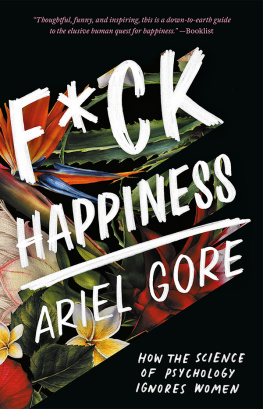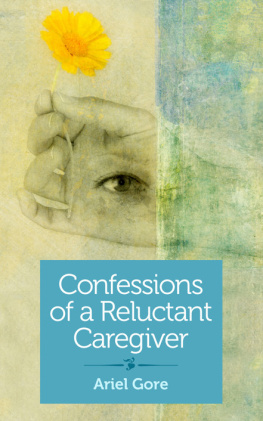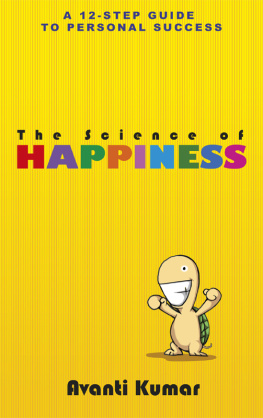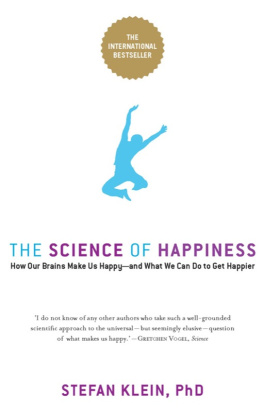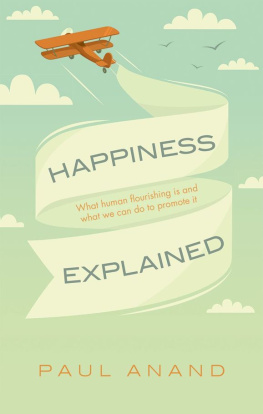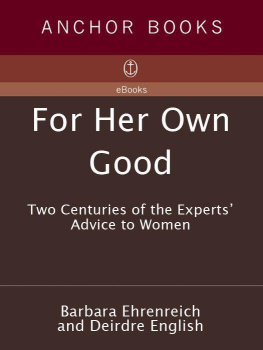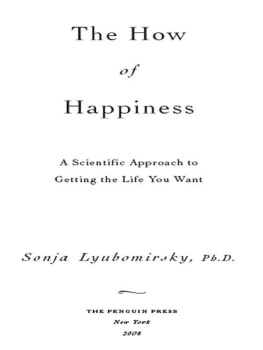Acknowledgments

Big-Hug thanks to these big-hearted geniuses for their input and help making F*ck Happiness happen: Bri Byram, Jess Clark, Elly Blue, Joe Biel, Lindsey Cleworth, Noah Deans-Gravlee, Lydia Rogue, Rachel Dutton, Grace Hansen, Faye Bender, China Martens, Linda Rand, Penni Jones, Margaret McConnell, Candace Walsh, Allison McCarthy, Deena Chafetz, Maia Swift, and Maximilian Gore-Perez.
THE TRUTH WE ARE TRYING NOT TO KNOW
It made me happy to withdraw my job application and go to the caf instead, read and write and eat blackberry cobbler and watch the rain.
FROM ARIELS JOURNAL
New Years Day arrives with freezing rain and news of closed bridges. I decline dinner invitations, explain that Im tired and nauseous and anyway, Im not drinking right now. Im surprised when these little clues dont give me away. Im six weeks pregnant, I have to explain, rather slowly.
Friends and family react with wide eyes and stunned silences.
Is this a joke? my mother practically screams into the phone.
Its not that Im too young, like they thought I was when I got pregnant with my daughter at eighteen. Its not even that they think Im too old. Its just that its been so long.
I have my own quiet doubts about my choice. Ive always wanted to have a second child, but the opportunity was slow to present itself. By the time my daughter started high school, I figured Id missed my chance. Who has children more than fifteen years apart? As college catalogs arrived in the mail and Maia studied for her SATs, I readied to change my life, too. I would be an empty nester by the time I turned thirty-seven, finally able to do all the things Id heard women without children dolike work even harder. I applied for a job in a cold city. I could finally make some real money. My partner was about to open a community acupuncture clinic and didnt want to move, and I didnt want to sell my house in Portland, so I planned to commute the two thousand miles. Id rent a studio apartment in the cold city, fly home on the weekends. When I envisioned my new life, it seemed hard and dark and serious. I saw myself trudging through arctic winds between concrete studio and concrete institution, but I didnt question the wisdom of my plan. It made good financial sense, after all, and who was I to question good financial sense?
When the desire to have another baby whispered in my ear, I tried to ignore it. I told myself that the quiet voice was fear in disguisehaving a kid at home was the only way Id ever known adult life. Surely all mothers of teenagers felt this strange urge to begin again. I decided to ask around. I posed the question to one friend and then another, but my mother-friends shook their heads and laughed. With teenage children on their way out the door, these moms had no longing to go back. I wanted to feel the way they did, the way I understood I was supposed to feelrelieved, finished. But thats not how I felt.
I was out at a smoky underground tavern, Etta James on the jukebox, sharing a beer with a friend whod always said she wanted to have a child. She talked as casually as she always had about finding the right partner, getting her career to a more stable place.
Youll be forty next year, I finally blurted, almost spraying her with my beer. You still think the perfect time and situation is just going to present itself? If you want to have a kid, youve got to work harder and smarter toward your goal.
She looked at me the way people look at you when youve just said something horribly inappropriate. And then she changed the subject.
A few days later, I sat in a folding chair in the shade of a sprawling California oak tree at the memorial service for my stepfather. Hed been the father Id known, the one who helped build the playhouse in my kindergarten schoolyard, the one who showed me the beauty of a high Sierra mountain trail, the one I called from a payphone on the coast of Spain when I realized I was pregnant with Maia. I scanned the row of faces to my left nowmy mother and grandmother, my sister and nephew, my nearly grown daughter. It had been a long year of death in our extended family. My daughters father had died unexpectedly in his early fifties, my partners mother in her sixties, a young writer-friend in her early twenties, and now my rock of a stepdad in his late eighties. I closed my eyes. Enough death already, I thought. When I opened my eyes, I looked up into the branches of that old oak tree, and without running the idea past the good and practical criticism in my brain, I said to God or to my stepdad or just to the tree and the blue sky behind it, Ill have another one if you want me to.
When we got home to Portland, I told my partner that I was ready to have another kid. She was game. We made lists of sperm banks, open adoption agencies, and possible known donors. I started tracking my cycle. Id take my own advice and work hard and smart toward my goal. Wed try everything at once and see which path opened up in front of us.
Three months later, I was pregnant.
Taking the job in that cold city and having a baby werent mutually exclusive, exactly, but by the time my breasts ached, it had become clear that I didnt want to go anywhere.
I mean, not that a baby is alwaysor even oftenthe answer. When Charlotte Perkins Gilman collapsed with depression in the 1880s, she sought the treatment of the renowned nerve specialist Dr. S. Weir Mitchell. She showed up in his Philadelphia office with the earnest hope for a cure and told him everything she had observed about her case. Her sickness vanished when she was away from her husband and daughter, she explained but returned as soon as she got home. The arrogant Dr. Mitchell wasnt interested in Gilmans own observations about her life. His prescription was simple: Live as domestic a life as possible Lie down an hour after each meal. Have but two hours intellectual life a day. And never touch pen, brush, or pencil as long as you live.
Gilman managed to follow the good doctors orders for a few years, but she sank deeper into her depression. I would sit blankly moving my head from side to side, she later wrote. I would crawl into remote closets and under beds to hide from the grinding pressure of that distress.
In her 1892 short story, The Yellow Wallpaper, she wrote, If a physician of high standing, and ones own husband, assures friends and relatives that there is really nothing the matter with one but temporary nervous depressiona slight hysterical tendencywhat is one to do?
Finally, in a moment of clear vision, Gilman woke up to the source of her illness. She divorced her husband and took off for California, baby in towand with pen, brush, and pencil all close at hand.
More than a hundred years later, how many of us can hear the truths that keep insisting themselves to us? How many of us can listen? How many of us can act on our moments of clear vision? Our desires have been patronized and pathologized for so long it takes serious courage to acknowledge that they even exist.
I was surprised as I started keeping this happiness journal, said Sonja, a doctor in her mid-thirties and one of the women on my council of experts. The question of contentment came up for me almost every day. I was content to be at work. I am happy enough. But am I content just to be content? I want to be happy. My mom was sort of a malcontent until she found out that she was very ill and dying. Then she got content. She did a good job of it, but she wasnt happy. It was just good enough. I want more.
Britt, a student and waitress in her mid-twenties, chimed in: Were made to feel selfish for making choices based on our own happiness instead of on other people or on our career. Sometimes I have to shake myself and say, Im not selfish! This is
Next page
